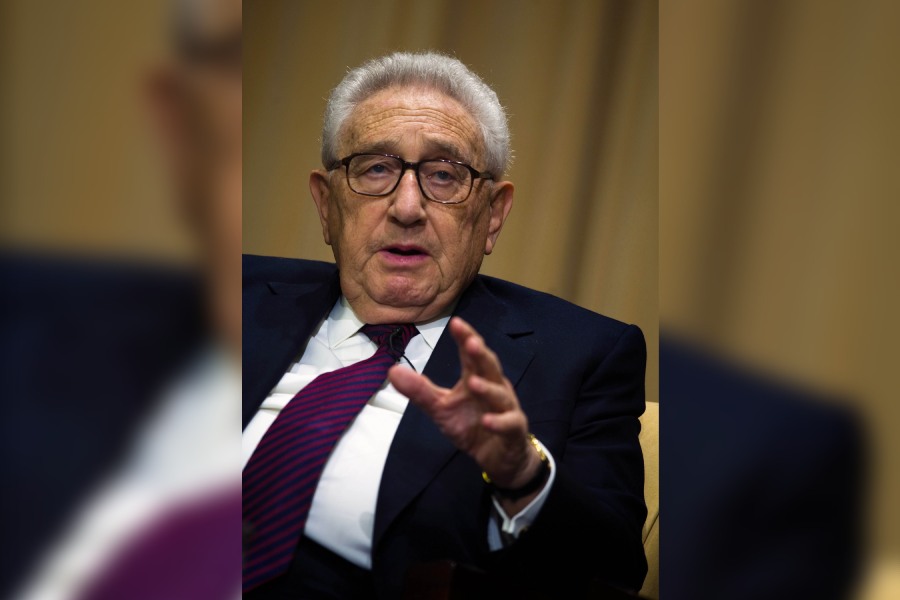Henry A. Kissinger, the scholar-turned-diplomat who engineered the United States’ opening to China, negotiated its exit from Vietnam, and used cunning, ambition and intellect to remake American power relationships with the Soviet Union at the height of the Cold War, sometimes trampling on democratic values to do so, died on Wednesday at his home in Kent, Connecticut. He was 100.
His death was announced in a statement by his consulting firm.
Few diplomats have been both celebrated and reviled with such passion as Kissinger. Considered the most powerful secretary of state in the post-World War II era, he was by turns hailed as an ultrarealist who reshaped diplomacy to reflect U.S. interests and denounced as having abandoned American values, particularly in the arena of human rights, if he thought it served the nation’s purposes.
He advised 12 presidents — more than a quarter of those who have held the office — from John F. Kennedy to Joe Biden With a scholar’s understanding of diplomatic history, a German-Jewish refugee’s drive to succeed in his adopted land, a deep well of insecurity and a lifelong Bavarian accent that sometimes added an indecipherable element to his pronouncements, he transformed almost every global relationship he touched.
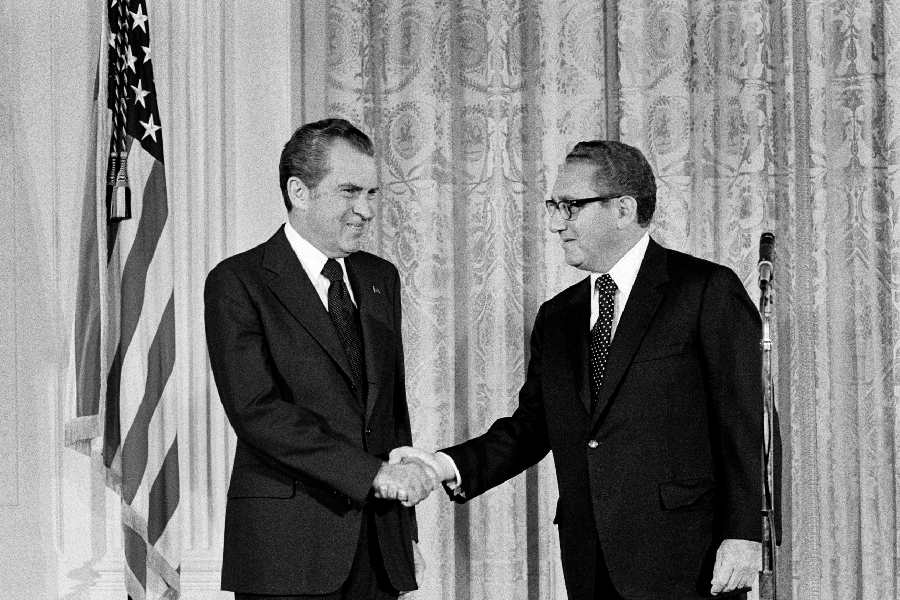
President Richard Nixon shakes hands with Henry Kissinger upon his swearing in as secretary of state, in Washington, Sept. 21, 1973. George Tames/The New York Times
At a critical moment in U.S. history and diplomacy, he was second in power only to President Richard Nixon. He joined the Nixon White House in January 1969 as national security adviser and, after his appointment as secretary of state in 1973, kept both titles, a rarity. When Nixon resigned, he stayed on under President Gerald Ford.
Kissinger’s secret negotiations with what was then still called Red China led to Nixon’s most famous foreign policy accomplishment. Intended as a decisive Cold War move to isolate the Soviet Union, it carved a pathway for the most complex relationship on the globe, between countries that at Kissinger’s death were the world’s largest (the United States) and second-largest economies, completely intertwined and yet constantly at odds as a new Cold War loomed.
For decades he remained the country’s most important voice on managing China’s rise, and the economic, military and technological challenges it posed. He was the only American to deal with every Chinese leader from Mao Zedong to Xi Jinping. In July, at age 100, he met Xi and other Chinese leaders in Beijing, where he was treated like visiting royalty even as relations with Washington had turned adversarial.
He drew the Soviet Union into a dialogue that became known as detente, leading to the first major nuclear arms control treaties between the two nations. With his shuttle diplomacy, he edged Moscow out of its standing as a major power in the Middle East, but failed to broker a broader peace in that region.
Over years of meetings in Paris, he negotiated the peace accords that ended the U.S. involvement in the Vietnam War, an achievement for which he shared the 1973 Nobel Peace Prize. He called it “peace with honor,” but the war proved far from over, and critics argued that he could have made the same deal years earlier, saving thousands of lives.
Within two years, North Vietnam had overrun the American-backed South. It was a humiliating end to a conflict that from the beginning Kissinger had doubted the United States could ever win.
To his detractors, the communist victory was the inevitable conclusion of a cynical policy that had been intended to create some space between the American withdrawal from Vietnam and whatever came next. Indeed, in the margins of the notes for his secret trip to China in 1971, Kissinger scribbled, “We want a decent interval,” suggesting he simply sought to postpone the fall of Saigon.
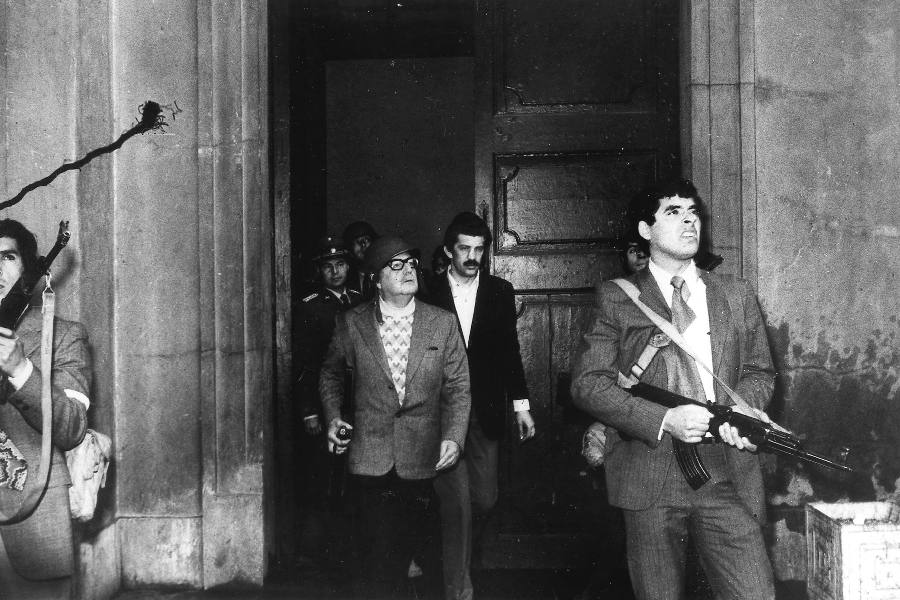
In one of the last photos of him alive, President Salvador Allende of Chile, center with helmet and assault rifle, is seen outside the presidential palace of La Moneda in Santiago as the military coup against him was underway, Sept. 11, 1973. The New York Times News Services
But by the time that interval was over, Americans had given up on the Vietnam project, no longer convinced that U.S. strategic interests were linked to that country’s fate.
As was the case with Vietnam, history has judged some of his Cold War realism in a harsher light than it was generally portrayed at the time. With an eye fixed on great power rivalry, he was often willing to be crudely Machiavellian, especially when dealing with smaller nations that he often regarded as pawns in the greater battle.
He was the architect of the Nixon administration’s efforts to topple Chile’s democratically elected socialist president, Salvador Allende.
He has been accused of breaking international law by authorizing the secret carpet-bombing of Cambodia in 1969-70, an undeclared war on an ostensibly neutral nation.
His objective was to root out the pro-communist Viet Cong forces that were operating from bases across the border in Cambodia, but the bombing was indiscriminate: Kissinger told the military to strike “anything that flies or anything that moves.” At least 50,000 civilians were killed.
When Pakistan’s American-backed military was waging a genocidal war in East Pakistan, now Bangladesh, in 1971, he and Nixon not only ignored pleas from the U.S. consulate in East Pakistan to stop the massacre, they approved weapons shipments to Pakistan, including the apparently illegal transfer of 10 fighter-bombers from Jordan.
Kissinger and Nixon had other priorities: Supporting Pakistan’s president, who was serving as a conduit for Kissinger’s then-secret overtures to China. Again, the human cost was horrific: At least 300,000 people were killed in East Pakistan and 10 million refugees were driven into India.
In 1975, Kissinger and then-President Ford secretly approved the invasion of the former Portuguese colony of East Timor by Indonesia’s U.S.-backed military. After the loss of Vietnam, there were fears that East Timor’s leftist government could also go communist.
Kissinger told Indonesia’s president that the operation needed to succeed quickly and that “it would be better if it were done after we returned” to the United States, according to declassified documents from Ford’s presidential library. More than 100,000 East Timorese were killed or starved to death.
Kissinger dismissed critics of these moves by saying that they did not face the world of bad choices he did. But his efforts to snuff out criticism with sarcastic one-liners only inflamed it.
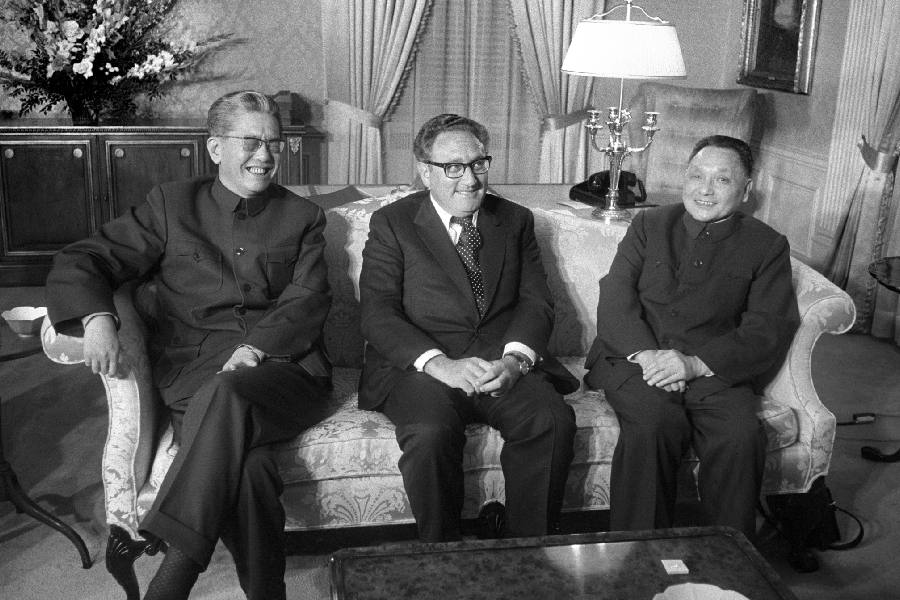
hinese Foreign Minister Chiao Kuan-Hua, U.S. Secretary of State Henry Kissinger and Chinese Vice Premier Deng Xiaoping during a dinner at the Waldorf Astoria hotel in New york, April 14, 1974. John Sotomayor/The New York Times
“The illegal we do immediately,” he quipped more than once. “The unconstitutional takes a little longer.”
On at least one potentially catastrophic stance Kissinger later reversed himself.
Starting in the mid-1950s as a young Harvard professor, he argued for the concept of limited nuclear war — a nuclear exchange that could be contained to a specific region. In office he worked extensively on nuclear deterrence — convincing an adversary, for instance, that there was no way to launch a nuclear strike without paying an unacceptably high price.
But he later conceded that it might be impossible to prevent a limited nuclear war from escalating. By the end of his life he had embraced, with reservations, a new effort to gradually eliminate all nuclear weapons and he began to warn of the instability posed by the rise of weapons driven by artificial intelligence.
“All I can do in the few years left of me is to raise these issues,” he said in 2018. “I don’t pretend to have the answers.”
Kissinger remained influential to the end. His latest writings on managing a rising China — including “On China” (2011), a 600-page book that mixed history with self-reverential anecdotes — could be found on the bookshelves of West Wing national security aides who followed him.
Relevant Into His 90s
Fifty years after he joined the Nixon administration, Republican candidates still sought Kissinger’s endorsement and presidents sought his approval. Even Donald Trump, after lambasting the Republican establishment, visited him during his 2016 campaign in the hope that the mere image of his seeking Kissinger’s advice would convey gravitas.
Kissinger laughed about the fact that Trump could not name, when New York Times reporters asked, a single new idea or initiative that he had taken away from the meeting. “He’s not the first person I’ve advised who either didn’t understand what I was saying or didn’t want to,” he said. Still, once in office, Trump used him as a back channel to the Chinese leadership.
President Barack Obama, who was 8 years old when Kissinger first took office, was less enamored of him. Obama noted toward the end of his presidency that he had spent much of his tenure trying to repair the world that Kissinger left. He saw Kissinger’s failures as a cautionary tale.
“We dropped more ordnance on Cambodia and Laos than on Europe in World War II,” Obama said in an interview with The Atlantic in 2016, “and yet, ultimately, Nixon withdrew, Kissinger went to Paris, and all we left behind was chaos, slaughter and authoritarian governments that finally, over time, have emerged from that hell.”
Few figures in modern American history remained so relevant for so long as Kissinger. Well into his 90s he kept speaking and writing, and charging astronomical fees to clients seeking his geopolitical analysis.
While the protesters at his talks dwindled, the very mention of his name could trigger bitter arguments. To his admirers, he was the brilliant architect of Pax Americana, the chess grandmaster who was willing to upend the board and inject a measure of unpredictability into U.S. diplomacy.
To his detractors — and even some friends and former employees — he was vain, conspiratorial, arrogant and short-tempered, a man capable of praising a top aide as indispensable while ordering the FBI to illegally tap his home phones to see if he was leaking to the press.
The irony was not lost on two generations of reporters, who knew that if they were looking for leaks — usually self-interested ones — Kissinger, a master of the art, was a ready source. “If anybody leaks in this administration, I will be the one to leak,” he said. And he did, prodigiously.
Increasingly isolated as the Watergate scandal unfolded, Nixon often turned to Kissinger, the undiminished star of his administration, for reassurance.
The Watergate tapes revealed Kissinger spending humiliating hours listening to the president’s harangues, including antisemitic comments delivered to his Jewish secretary of state. Kissinger often responded with flattery. After returning to his office, he would roll his eyes as he told his closest colleagues about Nixon’s bizarre behavior.
Leaks and Paranoia
Kissinger was not involved in the Watergate affair. Yet the break-in at the offices of the Democratic National Committee by a White House team of burglars and the administration’s attempts to cover up the crime emerged from a culture of suspicion and secretiveness that many argue that he helped foster.
In the spring of 1969, soon after taking office, he was so enraged by the leaks behind a Times report of the Cambodia bombing campaign that he ordered the FBI to tap the phones of more than a dozen White House aides, including members of his own staff. The recordings never turned up a culprit.
He was similarly infuriated by the publication of the Pentagon Papers in the Times and The Washington Post in 1971. The classified documents chronicled the government’s war policies and planning in Vietnam, and leaking them, in his view, jeopardized his secret face-to-face diplomacy. His complaints helped inspire the creation of the White House burglary team that would later break into Democratic headquarters at the Watergate building.
In August 1974, as Nixon reconciled himself to the choice between impeachment and resignation, he drew Kissinger into one of the most operatic moments in White House history. Having told Kissinger that he intended to resign, a distraught Nixon asked his secretary of state to kneel with him in silent prayer outside the Lincoln Sitting Room.
Yet, as Nixon sank deeper into Watergate, Kissinger attained a global prominence few of his successors have matched.
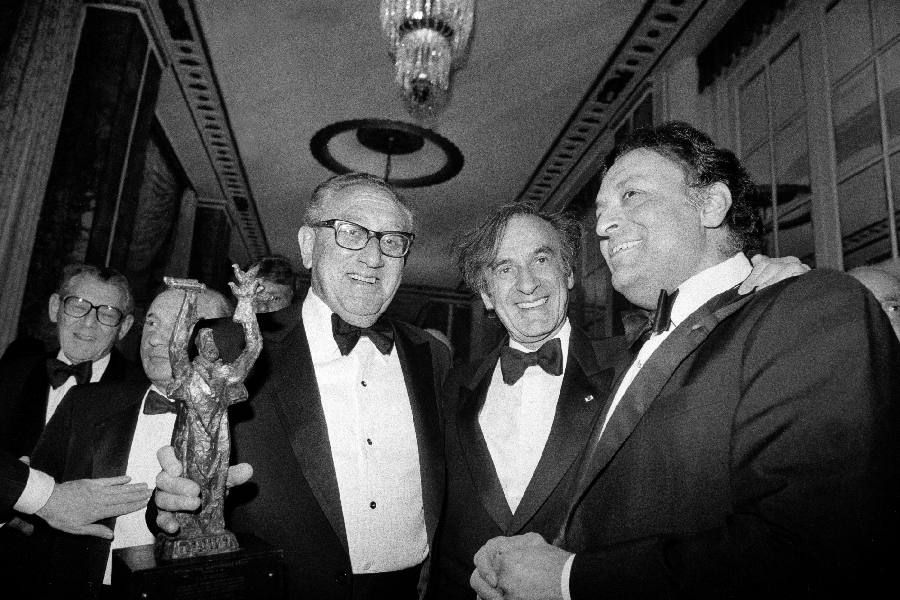
From left, Henry Kissinger, Elie Wiesel and Zubin Mehta, at a ceremony for the 40th anniversary of the liberation of the concentration camps at the Waldorf Astoria in New York, April 2, 1985. Larry C. Morris/The New York Times
Aides described his insights as brilliant and his temper ferocious. They told stories of Kissinger throwing books across his office in towering rages, and of a manipulative streak that led even his most devoted associates to distrust him.
“In dealing with other people he would forge alliances and conspiratorial bonds by manipulating their antagonisms,” Walter Isaacson wrote in his comprehensive 1992 biography, “Kissinger,” a book its subject despised.
“Drawn to his adversaries with a compulsive attraction, he would seek their approval through flattery, cajolery and playing them off against others,” Isaacson observed. “Secrecy came naturally to him as a tool of control. And he had an instinctive feel for power relationships and balances, both psychological and geostrategic.”
In old age, when the hard edges had been filed down and old rivalries had receded or been buried along with his former adversaries, Kissinger would sometimes talk about the comparative dangers of the global order he had shaped and a far more disorderly world facing his successors.
There was something fundamentally simple, if terrifying, in the superpower conflicts he navigated; he never had to deal with terrorist groups such as al-Qaida or the Islamic State group, or a world in which nations use social media to manipulate public opinion and cyberattacks to undermine power grids and communications.
“The Cold War was more dangerous,” Kissinger said in a 2016 appearance at the New-York Historical Society. “Both sides were willing to go to general nuclear war.” But, he added, “today is more complex.”
The great-power conflict had changed dramatically from the cold peace he had tried to engineer. No longer ideological, it was purely about power. And what worried him most, he said, was the prospect of conflict with “the rising power” of China as it challenged the might of the United States.
Russia, in contrast, was “a diminished state,” and no longer “capable of achieving world domination,” he said in a 2016 Times interview.
Yet he warned against underestimating Vladimir Putin, the Russian leader. Making reference to Hitler’s autobiographical manifesto, he said: “In order to understand Putin, one has to read Dostoyevsky, not ‘Mein Kampf.’ He believes Russia was cheated, that we keep taking advantage of it.”
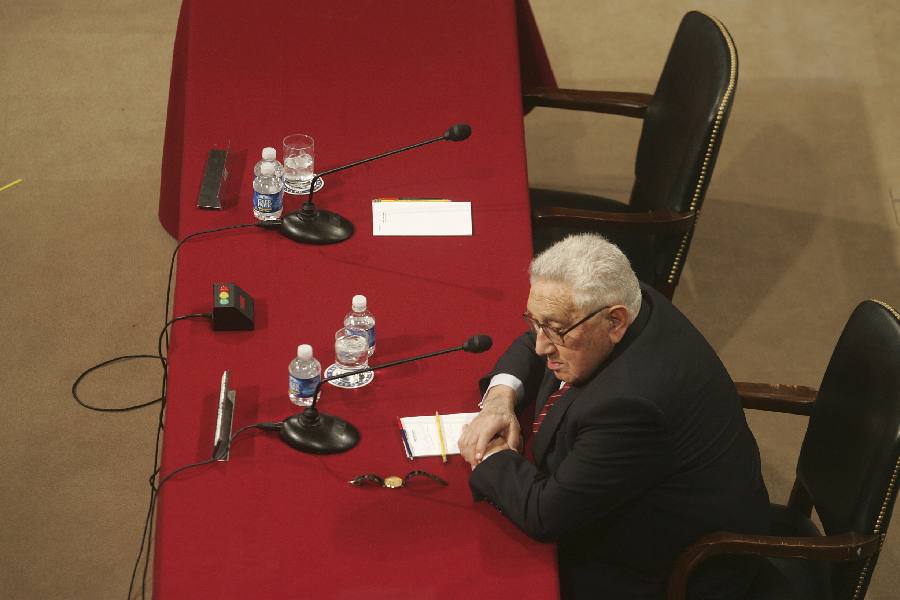
Former Secretary of State Henry Kissinger testifies before the Senate Foreign Relations Committee on Capitol Hill, Washington, on Jan. 31, 2007. Stephen Crowley/The New York Times
Kissinger took some satisfaction in the fact that Russia was a lesser threat. After all, he had concluded the first strategic arms agreement with Moscow and steered the United States toward accepting the Helsinki Accords, the 1975 compact on European security that obtained some rights of expression for Soviet bloc dissidents. In retrospect, it was one of the droplets that turned into the river that swept away Soviet communism.
Man About Town
At the height of his power, Kissinger cut a figure that no Washington diplomat has matched since. This pudgy, short Harvard professor with nerdy, black glasses was seen in Georgetown and Paris with starlets on his arm, joking that “power is the greatest aphrodisiac.”
In New York restaurants with actress Jill St. John, he would hold hands or run his fingers through her hair, giving gossip columnists a field day. In fact, however, as St. John told biographers, the relationship had been close but platonic.
The joke in Washington was that Kissinger flaunted his private life to hide what he was doing at the office.
There was plenty to hide, notably the secret meetings in Beijing that carved out Nixon’s opening to China. When the turn toward China ultimately became public, it changed the strategic calculus of American diplomacy and shocked U.S. allies.
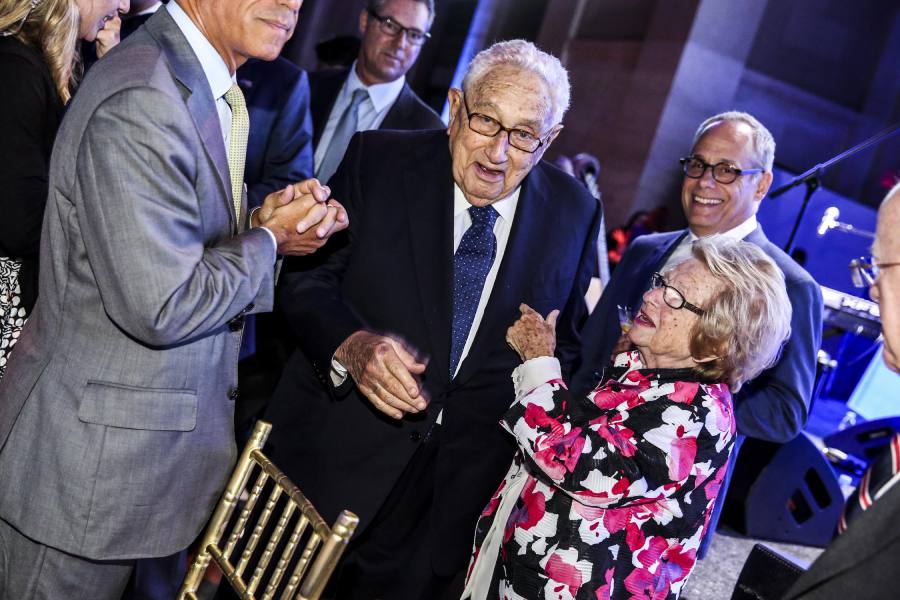
Henry A. Kissinger, center, and Dr. Ruth Westheimer at the 9/11 Memorial Dinner at Cipriani Wall Street in New York, Sept. 7, 2016. Krista Schlueter/The New York Times
“It’s almost impossible to imagine what the American relationship with the world’s most important rising power would look like today without Henry,” Graham Allison, a Harvard professor who once worked for Kissinger, said in an interview in 2016.
Other Kissinger efforts yielded mixed results. Through tireless shuttle diplomacy at the end of the Yom Kippur War in 1973, Kissinger was able to persuade Egypt to begin direct talks with Israel, an opening wedge to the later peace agreement between the two nations.
But perhaps the most important diplomatic contribution Kissinger made was his sidelining Moscow in the Middle East for four decades, until Putin ordered his air force to enter the Syrian civil war in 2015.
Kissinger’s greatest failures came in his seeming indifference to the democratic struggles of smaller nations. Oddly, a man driven from his country as a boy by the rise of the Nazis seemed unperturbed by human rights abuses by governments in Africa, Latin America, Indonesia and elsewhere. Nixon’s Oval Office tapes showed that Kissinger was more concerned with keeping allies in the anti-communist camp than how they treated their own people.
For decades he would battle, often unconvincingly, accusations that he had turned a blind eye to human rights abuses. Perhaps the most egregious episode came in the signals to Pakistan that it was free to deal with Bengalis in East Pakistan as it saw fit.
In “The Blood Telegram: Nixon, Kissinger, and a Forgotten Genocide” (2013), Princeton University scholar Gary J. Bass depicts Kissinger ignoring warnings of an impending genocide, including those from the U.S. consul-general in East Pakistan, Archer Blood, whom he punished as disloyal.
In the Oval Office tapes, “Kissinger sneered at people who ‘bleed’ for ‘the dying Bengalis,’” Bass wrote.
Escape to America
Heinz Alfred Kissinger was born May 27, 1923, in the Bavarian town of Fürth. In the fall of 1938, with war still a year away, Nazi authorities permitted his family to leave Germany for New York.
Divorced in 1964 after a 15-year marriage to Ann Fleischer, Kissinger married Nancy Maginnes in 1974. His primary residence was in Manhattan.
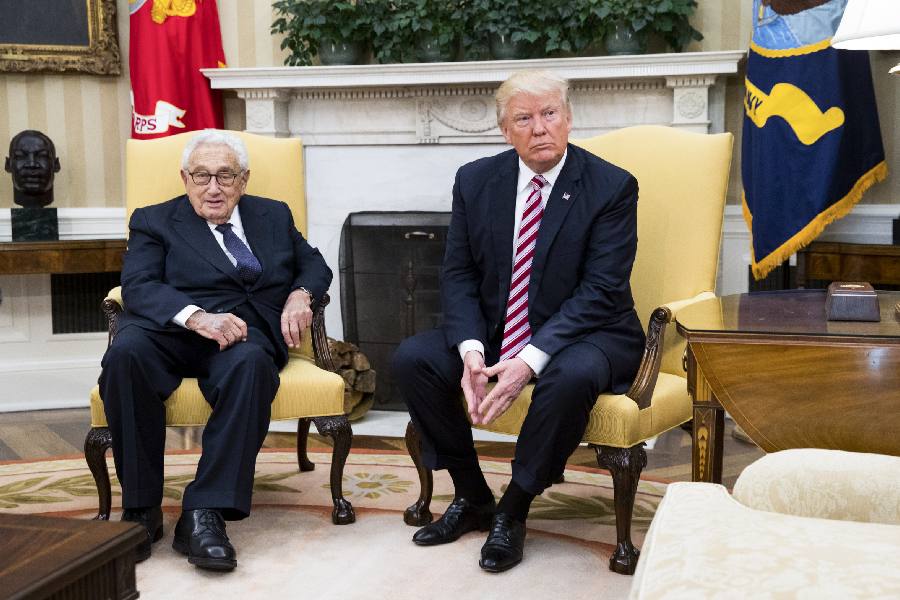
Former Secretary of State Henry Kissinger during a meeting with President Donald Trump in the Oval Office of the White House, in Washington, May. 10, 2017. Doug Mills/The New York Times
Kissinger is survived by his wife. His younger brother, Walter B. Kissinger, a former chair of multinational company the Allen Group, died in 2021.
Kissinger never resumed teaching after leaving government service. But he continued to write at a pace that embarrassed his former academic colleagues for their slowness. He produced three volumes of memoirs filling 3,800 pages.
“World Order,” published in 2014, was something of a valedictory assessment of geopolitics in the second decade of the 21st century. In it he expressed worry about the United States’ capacity for leadership.
“After withdrawing from three wars in two generations — each begun with idealistic aspirations and widespread public support but ending in national trauma — America struggles to define the relationship between its power (still vast) and its principles,” he wrote.
At age 96, he plunged into questions surrounding artificial intelligence, teaming up with Eric Schmitt, Google’s former CEO, and computer scientist Daniel Huttenlocher to write “The Age of AI: And Our Human Future (2019). Kissinger’s final book, “Leadership: Six Studies in World Strategy,” was published in 2022.
He continued to wield influence in world affairs, and through his firm, Kissinger Associates, he advised corporations and executives on international trends and looming difficulties.
“Henry is certainly one of the most complex characters in recent American history,” said David Rothkopf, a former managing director of Kissinger’s consulting firm. “And he is someone who has, I think, justifiably been in the spotlight both for extraordinary brilliance and competence and, at the same time, clear defects.”
The New York Times News Service

